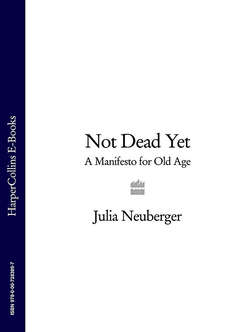Читать книгу Not Dead Yet: A Manifesto for Old Age - Julia Neuberger - Страница 35
Call to arms
ОглавлениеWhen the first, fraught debate took place in Parliament extending detention without trial for terrorist suspects beyond the current 28 days, the House of Lords was the epicentre of the argument. Even without the hereditary peers, many members of the House of Lords are extremely old. I remember, on the night of the debate, some quite old men and women hobbling in, settling down to sleep on the floor of the library or in some other corner, and waking to vote every four or five hours.
By the end of the next 24 hours the legislation had been defeated. But I remember hearing several of those peers say: ‘I went through the war,’ or something similar. ‘If Tony Blair thinks he can get shot of me, he’ll have to think again.’
It made me realize how much society is losing out by forcing other people of similar ages out of work, whether they are capable or not. These elderly peers weren’t having it: they rose to the occasion and took responsibility, and did so effectively. If they can do it, why are we stopping other people from doing it? Even the staff at the House of Lords have to retire at 65. So a key piece of our manifesto is that the government should look again at age discrimination.
People who are capable of carrying out a useful working role should be allowed to do so, no matter how old they are. It is time for age discrimination legislation to ban compulsory retirement ages. The government should never have listened to the CBI when they rejected the idea of making the retirement age more flexible. Of course it is easier for human resources departments if people have a set retirement age of 60 or 65. Then they don’t have to worry about assessing people’s capabilities as they grow older. But that is not a good enough reason to justify the pain and ill health caused by forcing capable people into retirement, not to mention the sheer waste of their skills and knowledge. In particular, the manifesto should include demands to:
Prevent insurers discriminating on the grounds of age. It is outrageous that capable older people are turfed out of their useful voluntary jobs for no other reason than that the insurance does not cover them. If they are capable of doing the job, then it is an appalling waste of badly needed skills for them to be weeded out. If they need to drive as part of the task, then they will clearly need to be checked periodically. But that is not enough reason for the community to lose their experience prematurely.
An end to the virtual ban on older people in frontline politics, women’s magazines or television. There has been a collective embarrassment about older women on the front of magazines, older political leaders and certainly about older TV presenters – even very slightly older ones. It is inhuman, wasteful and ignorant for this to continue, and no leader and manager should allow their organization to be caught displaying this youthful fear of age and experience.
New ways of organizing mutual support through local volunteering. If older people feel the need for a role – and they do – there is no reason, apart for the economic one, why that has to be paid. Voluntary roles provide a similar kind of recognition, and equal opportunities for social contact and meeting people. A great deal of this goes on already, but there needs to be much more if we are going to provide the kind of social care an ageing population requires. It does not have to be useful in the strictly utilitarian sense, but it does have to be useful to the person who does it. And, as the National Trust does so well, it has to have recognition and status.
A massive opening up of public services by inviting in tens of thousands of older volunteers. They will be the driving force that humanizes them, makes them effective and making sure that older recipients of care get the kind of humane service that they deserve. The way this can be done is to expect former hospital patients, for example, to play their part after they have been discharged, as part of a wider support network, checking up on patients who have been discharged, or engaged in other vital forms of outreach. What can be done in the NHS can be applied to other public services too, especially if the role of health centres and schools – even perhaps police stations – could be expanded to reach out into the local community and match surrogate grandparents with younger families and children who need them.
